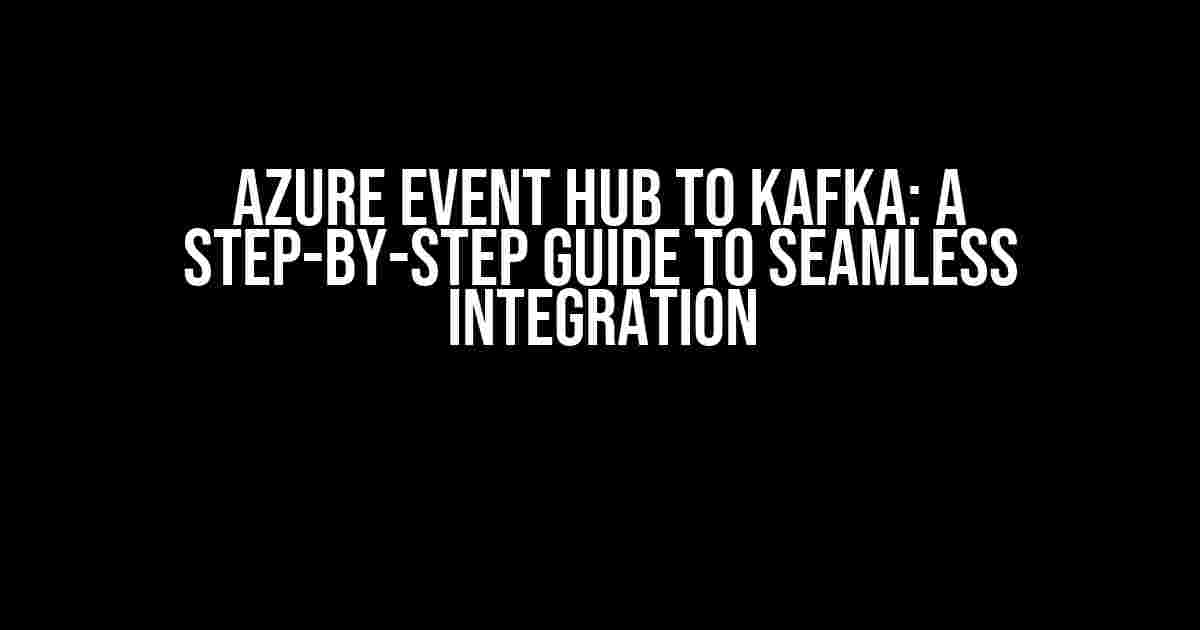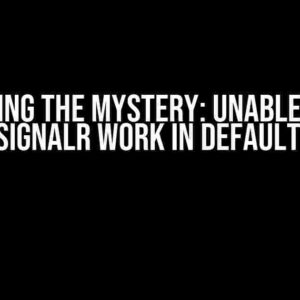Are you tired of dealing with the complexities of event-driven architecture? Do you want to harness the power of Azure Event Hubs and Apache Kafka to streamline your data pipeline? Look no further! In this comprehensive guide, we’ll walk you through the process of integrating Azure Event Hubs with Kafka, ensuring a seamless and efficient data flow.
- Why Integrate Azure Event Hubs with Kafka?
- Prerequisites
- Step 1: Create an Azure Event Hubs Connection
- Step 2: Create a KafkaProducer
- Step 3: Configure the Azure Event Hubs Kafka Connector
- Step 4: Consume Events from Azure Event Hubs and Produce to Kafka
- Step 5: Verify the Integration
- Troubleshooting Common Issues
- Conclusion
- References
Why Integrate Azure Event Hubs with Kafka?
Azure Event Hubs and Kafka are two powerful tools in the world of event-driven architecture. Azure Event Hubs is a fully managed, cloud-based event ingestion service that allows you to ingest, process, and analyze massive amounts of telemetry data in real-time. Kafka, on the other hand, is a distributed streaming platform that enables high-throughput, fault-tolerant, and scalable data processing.
By integrating these two services, you can leverage the strengths of both worlds:
- Scalability**: Azure Event Hubs can handle massive amounts of telemetry data, while Kafka provides a scalable and fault-tolerant platform for processing and analyzing that data.
- Real-time Processing**: Azure Event Hubs enables real-time event processing, which can be further enhanced by Kafka’s ability to process streams of data in real-time.
- Fault Tolerance**: Kafka’s distributed architecture ensures that your data pipeline remains operational even in the event of failures or outages.
Prerequisites
Before we dive into the integration process, make sure you have the following prerequisites in place:
- Azure Event Hubs namespace and event hub created
- Kafka cluster set up and running (locally or on a cloud platform)
- Azure Event Hubs and Kafka versions compatible with each other ( Azure Event Hubs: 1.1.0 or later, Kafka: 2.0.0 or later)
- Java 8 or later installed on your machine
Step 1: Create an Azure Event Hubs Connection
To integrate Azure Event Hubs with Kafka, you need to create a connection to your Event Hubs namespace. This connection will enable Kafka to consume events from Event Hubs.
// Import necessary packages
import com.microsoft.azure.eventhubs.EventHubClient;
import com.microsoft.azure.eventhubs.EventHubConnectionStringBuilder;
// Create an Event Hubs connection string
String connectionString = "Endpoint=sb://.servicebus.windows.net/;SharedAccessKeyName=;SharedAccessKey=";
// Create an Event Hubs client
EventHubClient eventHubClient = EventHubClient.createFromConnectionString(connectionString);
Step 2: Create a KafkaProducer
Next, you need to create a KafkaProducer instance to produce events to your Kafka topic. You’ll need the Kafka client library and the Azure Event Hubs Kafka connector.
// Import necessary packages
import org.apache.kafka.clients.producer.KafkaProducer;
import org.apache.kafka.clients.producer.ProducerConfig;
import org.apache.kafka.common.serialization.StringSerializer;
// Create a KafkaProducer instance
Properties props = new Properties();
props.put("bootstrap.servers", ":9092");
props.put("key.serializer", StringSerializer.class.getName());
props.put("value.serializer", StringSerializer.class.getName());
KafkaProducer<String, String> producer = new KafkaProducer<>(props);
Step 3: Configure the Azure Event Hubs Kafka Connector
The Azure Event Hubs Kafka connector enables Kafka to consume events from Event Hubs. You need to configure the connector with the necessary settings.
// Import necessary packages
import org.apache.kafka.connect.connector.Connector;
import org.apache.kafka.connect.runtime.Context;
import org.apache.kafka.connect.runtime.Worker;
import com.microsoft.azure.eventhubs.EventHubClient;
// Create a new instance of the Azure Event Hubs Kafka connector
Connector connector = new EventHubSinkConnector();
// Configure the connector with the necessary settings
Map<String, String> settings = new HashMap<>();
settings.put("eventhubs.namespace", "");
settings.put("eventhubs.sharedAccessKeyName", "");
settings.put("eventhubs.sharedAccessKey", "");
settings.put("eventhubs.eventhub", "");
settings.put("kafka.topic", "");
connector.start(settings);
Step 4: Consume Events from Azure Event Hubs and Produce to Kafka
Now, you can consume events from Azure Event Hubs and produce them to your Kafka topic using the KafkaProducer instance and the Azure Event Hubs Kafka connector.
// Consume events from Azure Event Hubs
EventHubClient eventHubClient = EventHubClient.createFromConnectionString(connectionString);
eventHubClient.receiveBatch(1).forEach(event -> {
// Produce the event to Kafka
producer.send(new ProducerRecord<>("", event.getBodyAsString()));
});
Step 5: Verify the Integration
To verify the integration, consume events from your Kafka topic and ensure that the events are being processed correctly.
// Consume events from Kafka
Consumer<String, String> consumer = new KafkaConsumer<>(props);
consumer.subscribe(Collections.singleton(""));
while (true) {
ConsumerRecords<String, String> records = consumer.poll(100);
for (ConsumerRecord<String, String> record : records) {
System.out.println("Received event: " + record.value());
}
}
Troubleshooting Common Issues
Encountering issues during the integration process? Check out this troubleshooting guide for common errors and solutions:
| Error | Solution |
|---|---|
| Cannot connect to Azure Event Hubs | Verify the Event Hubs connection string and ensure that the namespace, shared access key name, and shared access key are correct. |
| KafkaProducer instance not producing events | Check the KafkaProducer configuration and ensure that the bootstrap servers, key serializer, and value serializer are correctly set. |
| Azure Event Hubs Kafka connector not consuming events | Verify the connector configuration and ensure that the Event Hubs namespace, shared access key name, shared access key, and event hub name are correctly set. |
Conclusion
Integrating Azure Event Hubs with Kafka may seem daunting, but with this comprehensive guide, you’re now equipped to streamline your data pipeline and unlock the full potential of event-driven architecture. By following these steps, you’ll be able to efficiently process and analyze massive amounts of telemetry data in real-time, leveraging the strengths of both Azure Event Hubs and Kafka.
Remember to stay tuned for more tutorials and guides on Azure Event Hubs, Kafka, and other cutting-edge technologies.
References
For further reading and in-depth documentation, refer to the following resources:
- Azure Event Hubs documentation: https://docs.microsoft.com/en-us/azure/event-hubs/
- Kafka documentation: https://kafka.apache.org/documentation/
- Azure Event Hubs Kafka connector documentation: https://github.com/microsoft/eventhubs-kafka-connector
Happy integrating!
Frequently Asked Questions
Get ready to deep dive into the world of Azure Event Hubs and Kafka! Here are some frequently asked questions to set you up for success.
What is the main difference between Azure Event Hubs and Kafka?
Azure Event Hubs is a fully managed, Cloud-based event ingestion service, whereas Kafka is an open-source, distributed event-streaming platform. While both can handle high-throughput and provide low-latency event processing, Azure Event Hubs is more geared towards large-scale, cloud-native event-driven architectures, whereas Kafka is often used in on-premises or hybrid environments.
How do I integrate Azure Event Hubs with Kafka?
You can integrate Azure Event Hubs with Kafka using the Azure Event Hubs Kafka Connector, which allows you to read and write events from Kafka topics to Azure Event Hubs, and vice versa. This connector provides a seamless bridge between the two platforms, enabling you to leverage the strengths of both Azure Event Hubs and Kafka in your event-driven architecture.
What are the key benefits of using Azure Event Hubs to Kafka?
By using Azure Event Hubs to Kafka, you can take advantage of Azure’s scalability, reliability, and security, while also leveraging Kafka’s flexibility and customization options. This integration also enables you to process events in real-time, reduce latency, and improve overall system performance. Additionally, you can use Azure Event Hubs’ built-in features, such as event capture, routing, and storage, to simplify your event-driven architecture.
Can I use Azure Event Hubs as a Kafka alternative?
Yes, Azure Event Hubs can be used as a Kafka alternative, especially in cloud-native environments. Azure Event Hubs provides similar event-streaming capabilities to Kafka, but with the added benefits of being a fully managed, Cloud-based service. However, if you’re already invested in the Kafka ecosystem or require specific features like log compaction or Kafka Streams, Kafka might still be the better choice.
What are some common use cases for Azure Event Hubs to Kafka?
Some common use cases for Azure Event Hubs to Kafka include IoT telemetry processing, log aggregation, real-time analytics, and event-driven architectures. Additionally, Azure Event Hubs to Kafka can be used for cloud-native application integration, microservices communication, and streaming data processing. The possibilities are endless, so get creative and explore the many use cases for this powerful integration!



